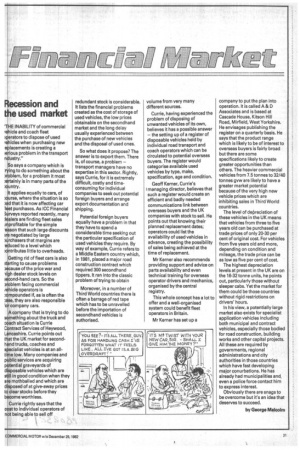volume from very many different sources.
Page 31

If you've noticed an error in this article please click here to report it so we can fix it.
Currie, having experienced the problem of disposing of unwanted vehicles of its own, believes it has a possible answer — the setting up of a register of disposable vehicles held by individual road transport and coach operators which can be circulated to potential overseas buyers. The register would categorise available used vehicles by type, make, specification, age and condition.
Geoff Kerner, Currie's managing director, believes that such a register would create an efficient and badly needed communications link between overseas buyers and the UK companies with stock to sell. He points out that knowing their planned replacement dates; operators could list the availability of used vehicles in advance, creating the possibility of sales being achieved at the time of replacement.
Mr Kerner also recommends providing support and advice on parts availability and even technical training for overseas operator drivers and mechanics, organised by the central registry.
This whole concept has a lot to offer and a well-organised system could benefit fleet operators in Britain.
Mr Kerner has set up a
company to put the plan into operation. It is called A 8E D Associates and is based at Cascade House, Kitson Hill Road, Mirfield, West Yorkshire. He envisages publishing the register on a quarterly basis. He says that the product range which is likely to be of interest to overseas buyers is fairly broad but there are some
specifications likely to create greater opportunities than others. The heavier commercial vehicles from 7.5 tonnes to 32/40 tonnes gvw are likely to have a greater market potential because of the very high new vehicle prices which are inhibiting sales in Third World countries.
The level of deOreciation of these vehicles in the UK means that vehicles from three to five years old can be purchased at trade prices of only 20-30 per cent of original cost. For vehicles from five years old and more, depending on condition and mileage, the trade price can be as low as five per cent of cost.
The highest depreciation levels at present in the UK are on the 16-32 tonne units, he points out, particularly those without sleeper cabs. Yet the market for them could be those countries without rigid restrictions on drivers' hours.
In his view, a potentially large market also exists for specialist application vehicles including both municipal and contract vehicles, especially those bodied for road construction, building works and other capital projects. All these are required by governments, regional administrations and city authorities in those countries which have fast developing major conurbations. He has already had municipalities and even a police force contact him to express interest.
Obviously there are snags to be overcome but it's an idea that deserves to succeed.
by George Malcolm


































